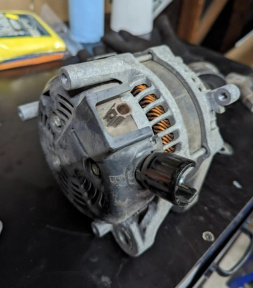
The alternator (or generator) is an auxiliary component of the engine, serving only one purpose: charging the car battery while driving. In principle, the alternator requires minimal maintenance but, like all other components, is subject to natural wear and tear.
Symptoms of a defective alternator
- A crack or break in the alternator's housing;
- The illumination of the charging indicator light;
- An increasingly loud whining noise as engine speed rises;
- The battery gradually losing its charge;
- Slower cranking of the starter motor;
A drop in voltage or voltage fluctuations are usually attributed to a faulty alternator regulator or worn-out carbon brushes (the latter is more likely with very high mileage). The charging voltage of the alternator can be checked with a multimeter: with the engine off, the car battery voltage should be between 12.2 and 13.6 volts. With the engine running at idle, the voltage should be between 13 to 14.8 volts and remain constant as engine speed increases. If the voltage does not reach these values after a few seconds, a defect in the alternator or the regulator is highly likely.
A defect can also be detected by listening: if the alternator starts to whine or grind as engine speed increases, this generally indicates a faulty alternator freewheel. Depending on the make and model, replacing it can be somewhat challenging, but in some older vehicles, it can be done in situ (remove the pulley, replace the bearing). The replacement parts are not overly expensive, with prices ranging from $30 to $70.
Is Repair Worth It?

For example, if only the voltage regulator has failed, a repair may be a viable option. However, if multiple issues are present, or if the alternator was removed from a high-mileage vehicle, a complete overhaul seems more sensible. Reconditioned alternators are readily available online (also as a service).
However, careful consideration is required here: a cheap offer often comes with the risk of using low-quality replacement parts, potentially leading to another breakdown. Moreover, there are many alternators of unknown quality (made in China). For those seeking lasting peace of mind, it is advisable to invest a bit more.
See Also:
Same articles

Understanding Vehicle Inspection and Verification Services: Why They Matter for Every Driver
GuidesVehicle inspection and verification services are an essential but often overlooked part of keeping roads safe and cars legally compliant. Most people only think about inspections when it’s...
KLIFEX Brand Overview: High-Quality Automotive Repair Kits for Affordable Repairs
GuidesThe automotive aftermarket has long needed solutions that combine reliability, durability, and affordability. Many car enthusiasts and services are looking for a way...
Fast, Reliable Vehicle Emissions & Inspection Services Made Simple
GuidesFast, reliable emissions and inspection services are essential for keeping vehicles road-ready, compliant with environmental regulations, and safe for daily driving. If you’re looking for quick...

